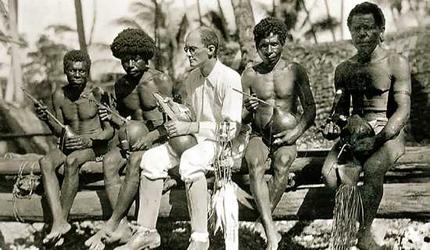Gift exchange: is there such a thing as a free gift?
4.1 Introduction
Watch the introductory tutorial video.
Introductory tutorial video
Transcript: Gift exchange and reciprocity

Bronislaw Malinowski in the Trobriand Islands
Out of copyright
Why do we give people gifts and what social obligations are involved? On the surface, giving a gift to another person may seem like a straightforward act of kindness, or a show of affection, or a symbol of appreciation. In contemporary Western society we are used to giving gifts based on these ideas and according to a complex calendar of gift-giving events, such as Christmas, birthdays, Valentine’s Day or Mother’s Day. In our daily lives we are also engaged in a broad and subtle range of gift exchange, from inviting friends to dinner, to buying a round of drinks at the pub, to giving spare change to the homeless. Again, these are often considered simple gestures of friendly interaction, or deference, or kindness; but beneath the surface there exist complex, culturally specific rules about how these exchanges take place.
We only need to think about the social implications of not sending a Christmas card or birthday present, or the awkwardness of giving or receiving a gift that is considered inappropriate in kind or value relative to the occasion (think of buying an exceptionally cheap or exceptionally expensive birthday present for a friend), in order to begin to understand the profound significance of gift exchange for social relations. In this unit you will be introduced to anthropological ideas about gift exchange and reciprocity. Using ethnographic examples you will explore how gift exchange serves a fundamental social purpose in structuring social relations of power. Gift exchange will also serve as the topic of our first assessed piece of work for this course.
By the end of this unit, you will:
- Understand how gift exchange has been conceptualised by anthropologists, with particular reference to reciprocity in social relations
- Be familiar with at least one ethnographic example of gift exchange
- Understand the relationship between reciprocity, power and social structure
- Be able to relate these ideas back to previous discussion about the functions of social institutions
- Have developed the ability to relate the above theories to an anthropological analysis of your own social and cultural context.